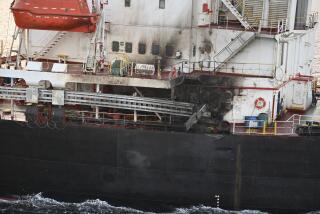Germans Joining Force Monitoring Serbs : Politics: Decision shows Kohl’s desire to amend constitutional limits on troops.
- Share via
BERLIN — In a development that strengthens international action against Serbia, Germany on Wednesday decided to join a multinational naval force forming in the Adriatic Sea to monitor U.N. sanctions against the Belgrade government and its lone ally, Montenegro.
Speaking after a Cabinet meeting in Bonn on Wednesday morning, Foreign Minister Klaus Kinkel said the government has agreed to send the destroyer Bavaria and three P-3 maritime patrol planes to the region immediately.
In other developments:
* Serb forces hurled artillery fire into Sarajevo and six other Bosnian towns Wednesday while their leader offered a fresh cease-fire at peace talks mediated by the European Community in London. The cease-fire proposal was met with skepticism as leaders of the warring sides refused to sit down at the same table, wire services reported.
* In Croatia, at least eight Croatian soldiers were killed and 35 people injured when Serb forces fired howitzer shells across the Bosnian border and hit a stadium in the town of Slavonski Brod.
* In Geneva, the head of the United Nations’ refugee agency, Sadako Ogata, called on leading nations to convene an emergency conference by July 29 to deal with the plight of the 2.2 million refugees generated by the fighting.
The decision to form the naval task force--which has explicit orders only to monitor, not to use force--was made last week at a 51-nation European security summit in Helsinki.
The German decision to join the operation in its earliest stages is considered highly significant and carries implications beyond the present Yugoslav crisis, for Germany and its Western allies.
In part, the move demonstrates Chancellor Helmut Kohl’s desire to push his interpretation of his country’s constitution to its political limits in an attempt to avoid the kind of isolation from its allies that Germany experienced during last year’s Persian Gulf War.
While the constitutional wording is highly ambiguous, previous German governments have insisted that it forbids any deployment of German military forces outside the NATO boundaries.
That interpretation left Germany, with one of the biggest armies in NATO, on the sidelines of the American-led anti-Iraq coalition.
Kohl’s Christian Democrats want to amend the constitution in a way that would enable German military forces to participate in U.N.-sponsored military actions, but he needs the support of the opposition Social Democrats to achieve the needed two-thirds parliamentary majority.
The sanctions-monitoring naval group is called the Standing Naval Force, Mediterranean, and is expected to begin its mission as early as today.
The seven-ship organization, which includes the American frigate Jack Williams, is currently under the direct command of a Turkish naval officer, Capt. Lutfu Sancar, who reports to the commander of allied forces in southern Europe, U.S. Adm. Mike Boorda.
While the Western European Union, a nine-nation all-European group, recently declared that it will play a role in enforcing the embargo, American officials said that none of the ships currently in the Adriatic are operating under the WEU’s command.
Germany, Greece, Italy, the Netherlands, Spain, Turkey, Britain and the United States have each dedicated a ship to the Standing Naval Force, although the British ship has been temporarily withdrawn from the force.
The United States has two other ships--the guided missile cruiser Biddle and the amphibious ship Iwo Jima--in the Adriatic, where they are providing communications and search-and-rescue assistance to the multinational effort to deliver humanitarian relief to Bosnia. Pentagon officials said those ships continue to report directly to the U.S. Navy’s Atlantic Command in Norfolk, Va.
Times staff writer Melissa Healy in Washington contributed to this article.
More to Read
Sign up for Essential California
The most important California stories and recommendations in your inbox every morning.
You may occasionally receive promotional content from the Los Angeles Times.













